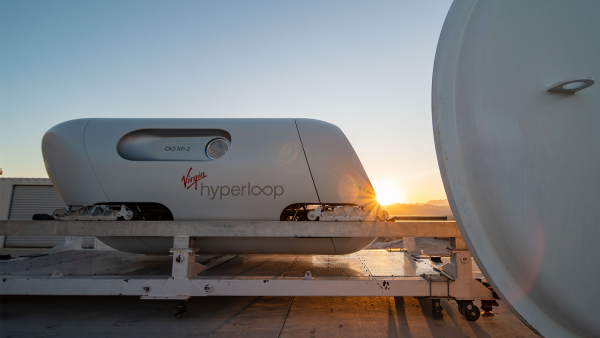NEW DELHI, India, 10 November 2020: Virgin Hyperloop made history Monday as the first people successfully travelled in a hyperloop pod at the DevLoop test facility in the USA.
“For the past few years, the Virgin Hyperloop team has been working on turning its groundbreaking technology into reality,” said Virgin Group founder Sir Richard Branson. “With today’s successful test, we have shown that this spirit of innovation will change the way people everywhere live, work, and travel in the years to come.”

Co-founder and chief technology officer Josh Giegel, and director of the passenger experience, Sara Luchian, were the first people in the world to ride on the new form of transportation. The testing campaign continues with Tanay Manjrekar, Virgin Hyperloop’s Power Electronics Specialist and native of Pune, India, riding next.
“Working on hyperloop – let alone being one of the first to ride it – is truly a dream come true,” said Manjrekar. “It is my hope that India sees the tremendous opportunity ahead of them – to embrace the challenge and leapfrog the rest of the world yet again – and continues to progress the Pune-Mumbai hyperloop project.”
The human testing, from the beginning stages all the way through to today’s successful demonstration, was overseen by the industry-recognized Independent Safety Assessor (ISA) Certifier. The newly-unveiled XP-2 vehicle demonstrates many of the safety-critical systems that will be found on a commercial hyperloop system and is equipped with a state-of-the-art control system that can detect abnormal conditions and rapidly trigger appropriate emergency responses.
“I can’t tell you how often I get asked ‘is hyperloop safe?'” said Virgin Hyperloop CEO Jay Walder. “With today’s passenger testing, we have successfully answered this question, demonstrating that not only can Virgin Hyperloop safely put a person in a pod in a vacuum environment but that the company has a thoughtful approach to safety which has been validated by an independent third party.”
The occupants made their maiden voyage on the newly-unveiled XP-2 vehicle, designed by BIG – Bjarke Ingels Group and Kilo Design, which was custom-built with occupant safety and comfort in mind. While the production vehicle will be larger and seat up to 28 passengers, the two-seater XP-2 vehicle was built to demonstrate that passengers can in fact safely travel in a hyperloop vehicle.
This announcement builds on significant progress around the world on the regulatory front. In India, the Government of Maharashtra has deemed hyperloop a public infrastructure project and approved the Virgin Hyperloop-DP World Consortium as the Original Project Proponent (OPP) for the Mumbai-Pune hyperloop project. This is a landmark announcement for building the Pune-Mumbai hyperloop transportation system, recognizing hyperloop technology alongside other more traditional forms of mass transit.
Further to the regulatory guidance document issued by the United States Department of Transportation’s Non-Traditional and Emerging Transportation Technology (NETT) Council, Virgin Hyperloop is looking to work with central authorities in India to explore a regulatory path for hyperloop in the country.
“Today’s test is a significant step forward towards a commercial hyperloop in India – perhaps the world’s first – connecting Pune with Mumbai along the existing Expressway,” said Harj Dhaliwal, Managing Director of the Middle East and India for Virgin Hyperloop. “The opportunity for India to lead the world in this new form of transportation is unprecedented. The project would be the largest private infrastructure investment in Maharashtra, creating 1.8 million direct and indirect jobs and USD36 billion in socio-economic benefits.”
This momentum, combined with the advancements at the Hyperloop Certification Center and the historic safety demonstration achieved today, will pave the way for the certification of hyperloop systems around the world – a key step towards commercial projects, including those in India while having the first human testing of the technology take place in the United States.
Beyond Maharashtra, there is enormous potential to connect the entire subcontinent. Last month, Virgin Hyperloop announced a groundbreaking partnership with Bangalore International Airport Limited (BIAL) to conduct a feasibility study for a proposed hyperloop corridor from BLR Airport. The study, which focuses on technical, economic and route feasibility, is expected to be completed in two phases of six months each. With speeds of up to 1,080 kph, hyperloop could transport thousands of passengers per hour from BLR Airport to the city centre in under 10 minutes, according to the preliminary analysis.
Virgin Hyperloop also signed an MoU with the State of Punjab’s Transport Department in December 2019 and hoped to expand on its relationship with Punjab as the company continues exploring opportunities in northern India, independent of their work in the western and southern regions of the country.
About Virgin Hyperloop
Virgin Hyperloop is the only company in the world that has successfully tested hyperloop technology at scale, launching the first new mode of mass transportation in over 100 years. The company successfully operated a full-scale hyperloop vehicle using electric propulsion and electromagnetic levitation under near-vacuum conditions, realizing a fundamentally new form of transportation that is faster, safer, cheaper, and more sustainable than existing modes. The company is now working with governments, partners, and investors around the world to make hyperloop a reality in years, rather than decades.
(Source: Bernama)






